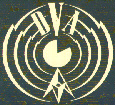

Adi Newton, leader of the Sheffield-based Clock DVA, sounds impatient and uninterested. Ask him a polite question and he will respond "Yeah, fine, yeah" or "Sure, yeah, sure." Responses to inquiries are punctuated by "no ... no," like blips on a fading patient's EKG.
Some of Clock DVA's recent material resembles that metaphor. Their latest communique, Man Amplified, is ten clumps of sequenced, staccato, digital percolation that incorporates connectionist theory, mysticism, computer technology and algorithmic activity. To their credit though, the music maintains a tense aura. The tired critical argument that electronic music is cold and emotionless is perhaps only half-correct; when you can't feel a definitive emotion, dance instead.
"I"ve heard that argument too, says a benign Newton. "But I've also been told that people find Man Amplified to be melodic and not exact. It's an exact technique sure, but there's an element of soul in there."
Clock DVA began in 1977 as an experimental collective with two cassettes, White Souls In Black Suits and Deep Floor. The band's aesthetic took a turn into choppy noise-funk representative of the early 1980's independent music scene in England with their first album Thirst (1981) and its attendant, classic single 4 Hours. The band broke up after the album, but Newton regrouped the members in 1983 for Advantage, a creative pinnacle that cross-pollinated film noire tension, Jazz urgency, radio-friendly Funk, spoken-word sadness and formless avante-garde sound painting. Clock DVA collapsed yet again under a storm of tempers and interpersonal attacks.
Newton then founded a collective called the Anti-Group which started out as a conventional Jazz/Rock/Funk/sound bite outfit that has since created more experimental work. In 1988 Newton reformed DVA with Robert Baker and Dean Dennis, emphasizing digital synthesis and sampling. The resultant album Buried Dreams and its vibrant single The Hacker came out in America on Wax Trax. All of the group's material is being released in America via Cargo Records through a licensing deal with the Italian label Contempo. Newton still finds merit in Clock DVA's past despite the band's current pursuit of a radically different direction.
"I'm quite happy when I listen to Thirst and Advantage," he says. "There are things on Advantage that I don't think we have done particularly right but 80 percent of it is VW. I think the early records stand in time. it sounds fresh on compact disc the format adds a lot of detail. You hear it for the first time in the way it should be listened to, you know?
It's still got longevity. The point of what I wanted to do was to capture something in time that remains. Like the old Jazz records, you play them now and it sounds exciting. It's timelessness."
The group's current high-tech digital onslaught seems to do away with the acoustic sounds of horns, guitars and piano. The members have no use for those sonorities and timbres, opting rather for electronically coded sound.
"We do use acoustic sounds," stresses Newton. "That's the point of using digital sampling and computer systems because you can capture many kinds of sounds with a microphone and then manipulate them. It's very electronic but we do use acoustic sources."
What about a listener's interaction level? A great deal of information is printed on the sleeves of the recent albums regarding each song's particular concept. Although much energy and care is taken to further these ideas, someone may merely be doing the dishes while the disc is playing.
"I think any kind of interaction is appropriate really," he surmises. "You could listen to it with headphones and relax. As for reactions from individuals, it's down to the individual response as to how they react to it.
"The information on the sleeves is expressly there to give people more information about a certain area and leave it at that, so they can decide what they wish to pursue. The idea is to set as much information out as we can. Of course the context of a sleeve is limited, but we try to use all areas available."
Say Adi, do you like to dance?
"Occasionally, yeah. When I'm moved to," he says, laughing. "Not as a matter of every week but when it feels right, yeah."
Many people think most dance music is mindless and at one time you could go into any club in any US city and hear The Hacker," which isn't a dance track but is far more chilling than Frontline Assembly. Despite intentions, is Clock DVA still perceived incorrectly, or at worst, mindlessly?
"I mean, it's obviously a very physical thing," he says. "I don't think that negates it or that it lacks intelligence. It's a form of expression, only physical. The Hacker wasn't designed as a dance record it's a heavy piece, but it's not a dance record. If people want to dance to it, I don't find it a problem. There is music that is mindless, sure, sure. It exists. It's always been there. But I think people seem to need that type of thing anyway."
A whole array of Clock DVA's electro-transmissions lies on the horizon: a single of Bitstream with a new track called Virtual Flesh, a book and CD package, a video collection of tracks from Buried Dreams and Man-Amplified, plus a collection of film scores recorded a year and a half ago entitled Digital Soundtracks. All products are going to be released on their own Anterior Research label via the Contempo/Cargo axis. There's also the possibility of another Anti-Group document as well, but Clock DVA remains Newton's priority. As a parting shot I call it his day job.
"No, I wouldn't call it that," he corrects sternly. "The way I do anything is to express thoroughly what is inside me which I enjoy doing. I won't do anything I don't enjoy. For me, that's my life."